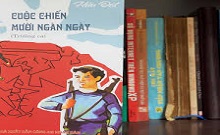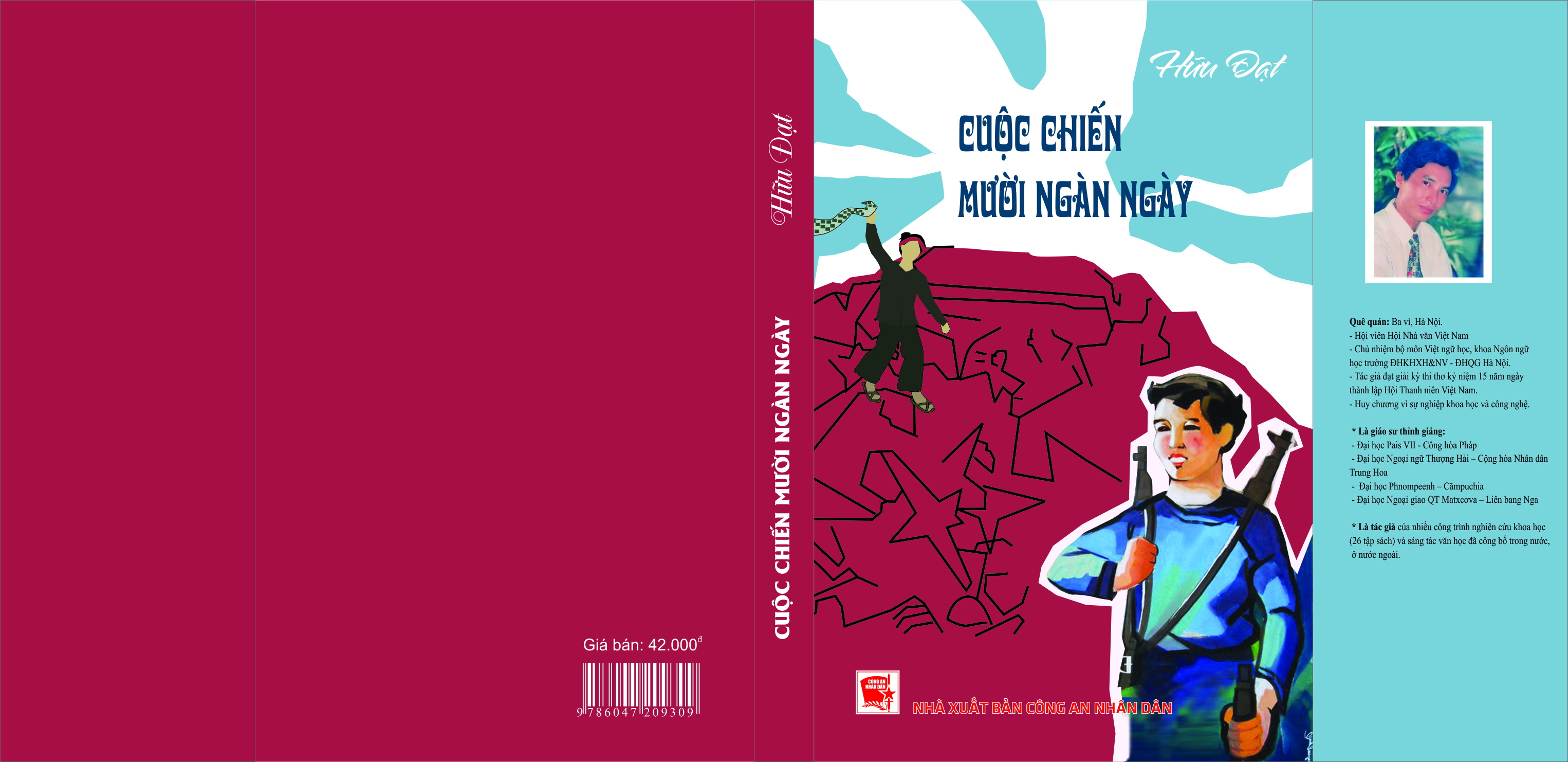
It was at that very moment that Hữu Đạt's epic poem "The Ten Thousand Day War" unexpectedly came to me – a historical epic. I read it out of curiosity, then became captivated, pondered over it, and couldn't help but write a few lines. I don't dare to comment on its literary merit, nor can I fully express my admiration and amazement at the creative "pictorial style" presented by the author in this epic poem. As a history teacher, I would like to share a few thoughts with my colleagues: this is a channel for bringing history into lectures, not only in terms of knowledge but also in terms of poetic sentiments that easily move the hearts of children, so that they will both love history and poetry.
*
Encompassing the story within ten thousand days, Huu Dat dedicated the entire epic poem to sketching the history of the country for over thirty years, starting from the August Revolution. Prior to that,In the dark night of slavery, under a crescent moon, the voices of the past echo: Who will save our homeland?The question was answered by the examples of Ton That Thuyet and his Royal Proclamation, Nguyen Trung Truc in the South, and Hoang Hoa Tham in the North, all of whom ultimately perished in a sea of blood.But the Vietnamese people, for a thousand years, have refused to live in cowardice, and now the time has come for the two Phan elders to rise up.With a few brushstrokes, the author analyzes the patriotic aspirations of the two elders, which ultimately failed. Meanwhile,The Party was born in time.If textbooks have to painstakingly present the content of the Thesis, here, only a few poetic strokes are needed.The manifesto states: The nation must achieve independence, the land of a thousand years must be returned to the peasants, the factories, mines, and plants, the workers become the masters who build them, the path is open and the whole nation is enthusiastic, let us join hands in solidarity between workers and peasants.It encapsulated the entire revolutionary goal: national independence, land for the peasants, factories for the workers, and a worker-peasant alliance. It was concise, easy to understand, and every student could remember it!
From then on, 15 years of struggle, bearing the traces of the Soviet Nghe An, the Southern Uprising, and the names of leaders like Tran Phu, Minh Khai, To Hieu, Nguyen Van Cu, Ha Huy Tap…Beneath a thatched hut in Tuyen Quang, an old man with white hair calmly convened the Dien Hong Conference.From the Tân Triều era, the order for the General Uprising was issued.The southward advance destroyed the Phai Khat outpost, the wind from a thousand directions blew, the sun shone on Na Ngan, the Grand Theater hoisted the national flag, the people's songs filled the sky, Hue and Saigon were bustling with activity, red flags fluttered throughout the streets.The entire General Uprising, from the Viet Bac war zone to the capital Hanoi, spreading to Hue and Saigon, is encapsulated in less than half a page of poetry, with unforgettable place names. And so it is.Eighty years of slavery, the people suffered, and history was stained with darkness.Until todayUnder the vast autumn sky of Ba Dinh Square, Uncle Ho read the Declaration of Independence amidst millions of compatriots, giving birth to Vietnam from the hands of imperialism. We swore an oath: We will live and die together, even if we have to burn down the entire Truong Son mountain range, determined to preserve our independence, for now and for the future.With this poem, students will surely engrave in their minds the Oath of Independence swore by President Ho Chi Minh on September 2, 1945: “The Vietnamese nation has the right to enjoy freedom and independence, and in reality has become a free and independent nation. The entire Vietnamese people are determined to dedicate all their spirit and strength, lives and property to safeguard that right to freedom and independence” (Declaration of Independence).
Thirty years of the national liberation struggle, beginning on the night of September 23, three weeks after Independence Day:Gunfire has begun to resound in Southern Vietnam, marking the opening act of the nine-year resistance war.As the war spread north, a sacred call resounded from Hanoi:We want peace, so we make concessions. We make concessions, and then the enemy encroaches further, because they want to seize our country again. We cannot live kneeling; we are determined to stand up.Huxu Dat's poems remind us of President Ho Chi Minh's call from years ago: "We would rather sacrifice everything than lose our country, than be enslaved."
For over sixty days and nights, Hanoi was engulfed in bloodshed and fire, fueled by an indomitable fighting spirit.Every street corner has been turned into a gun emplacement, every road into a bloodbath of sacrifice.But then, due to strategic needs, the Capital Regiment had to temporarily leave the city.Leaving behind the grimy streets, silently weeping amidst the flares of gunfire.with deep-seated feelingsI miss you so much, Hanoi!From that time onwards, history recorded a series of victories from the Lo River, the border, Nghia Lo, Hoa Binh… and finally, the Dien Bien Phu campaign. Many of the author's poems have awakened readers' memories of these great campaigns, from the very beginning.The Politburo held a meeting in a bamboo hut.timeUncle Ho entrusted you with this important responsibility, and you must win the Battle of Dien Bien Phu this time.Having fully entrusted the mission to him by President Ho Chi Minh, General Vo Nguyen Giap, from the border region, pondered day and night about the battle, and finally arrived at the scene.A difficult, tearful decision, having moved the artillery in, now moving it back out, changing the plan from a quick attack to a steady advance.After 55 days and nights of smoke, fire, and bombs, they achieved the final victory.The nine-year resistance war ended, and the Battle of Dien Bien Phu shone brightly in history.True to the promise made 9 years ago,Hanoi today is bathed in bright sunshine, the five city gates bustling with activity as troops return.
But it was also from there, in GenevaThe agreement divided the country in two, and the virtuous suffered with every ferry crossing. The night of slavery still lingered in half the country.And so the long march continued for another twenty years, with armies marching to battle, and countless place names successively entering history.The victories at Bau Bang, Ap Bac, Lai Ta Con, Lung Cu, and Khe Sanh are over.The Tet Offensive forced the enemy to the negotiating table. The author skillfully recounts the battle of wits, "fighting and negotiating":In every handshake, there were threats, yet I still proudly returned the smiles.The capital city bravely confronted the B52s.During the 12 days and nights of the Dien Bien Phu air battle, Hanoi stood firm, a testament to its enduring strength.After years of protracted and deceitful maneuvering, the opposing side was forced to sign the Paris Agreement. The American troops left, leaving the puppet army behind in panic and confusion.Seizing the opportunity, we advance; in the mountains and countryside, we set up a battle formation to annihilate the enemy.Again, the place names associated with the campaign: Buon Ma Thuot, Pleiku, Kontum, Hue, Da Nang, and beyond.Today is the final battle, the battle that stunned America, the nation rejoicing in the Great Spring Victory..

*
Thirty years of war, each line of poetry transports the reader back to those arduous yet vibrant and spirited days.To take up arms and go into battle, one must only know how to attack and never retreat.A generation of courageous and fearless individuals who are willing to sacrifice and take on responsibility.Four thousand years of history await.It was that very spirit that multiplied our strength in the war, writing glorious chapters in the nation's history.
But on the other hand, war is not a colorful tapestry; it also involves separation, loss, and suffering. The poet does not shy away from this; his verses delve into the hidden corners of the soul, very real and very lifelike. Huu Dat describes the pain of war with verses full of reflection and emotion:Nowhere on earth is it that every family lineage must wear mourning scarves.Again, the question arises: Is there any place on Earth where...In every house there are soldiers' uniforms, in every street corner there are people going to war, in every room there is a farewell.In that farewell, the girls of marriageable age silently conveyed their questions through their tears.If he leaves, will he ever come back?Oh, the unspoken question, choked with anxieties and torments that tormented the souls of countless young women day and night. The sorrow of the woman whose husband is away fighting is conveyed through imagery-filled poetry, shaped like the letter S – the Vietnamese homeland – evoking profound emotion. That same question, the same question, resonates with countless mothers anxiously waiting, day after day, night after night, listening to the sound of gunfire, awaiting letters from their sons on the front lines. But alas, often it is a letter announcing death.Every evening, a mother weeps, having heard the news that her son died in battle and will never return.Like a bolt from the blue, the mother struggled to hide her tears of grief for her child. The price of war lingered like a deep wound in people's hearts and lives. This reality is crucial for the younger generation to understand and be prepared to face it in today's struggle for our islands and seas.Awareness of the East Sea from that time has permeated every mountain, every blade of grass, and the heartbeat of generations, Hoang Sa, Truong Sa, waves, sky, and clouds.along with the curseWe cannot allow the enemy to steal even a tiny speck of blue floating in the sky. We cannot let them trample on even a single grain of sand, even when it is still a tender embryo.
*
Let's pause here for a few reflections. The author uses history to write poetry. History teachers, through their lectures, should guide students to history through poetry. Huu Dat – a writer, poet, linguist, and educator – has provided a successful example of integrating literature and history, opening a channel to delve into history through poetry alongside the formal textbooks currently used in schools. Then, the young generation we look forward to will both love history and be captivated by poetry!
Author:Professor Vu Duong Ninh, People's Teacher
Newer news
Older news